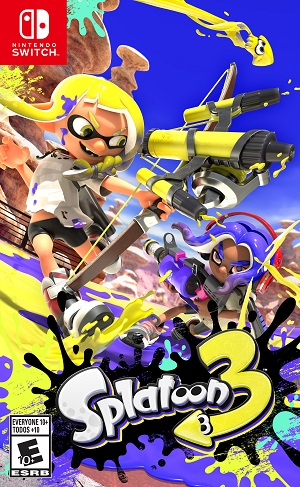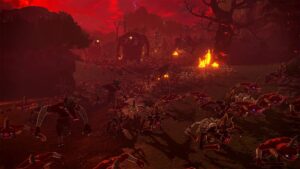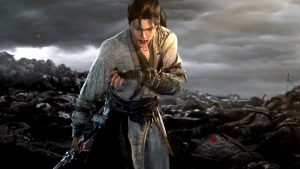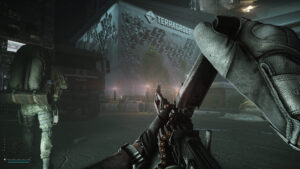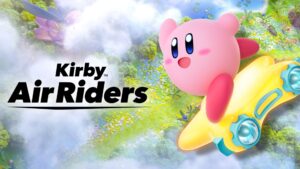
Splatoon as a series stands out because of its astonishingly compelling and pure fun central concept, which makes the simple act of just moving in the game utterly enjoyable and enthralling. Nintendo’s long awaited take on the multiplayer shooter was quintessentially Nintendo in all the best and worst ways, and the end result was something unlike anything else in the genre. When the first Splatoon launched on the ill-fated Wii U all the way back in 2015, its stumbles were easy to overlook in favour of the sheer novelty – yes, there may have been some quirks and eccentricities involved, but when nothing else on the market plays like it, then you’re far more likely to put up with them.
But the issue is Splatoon is no longer one of a kind. Which isn’t to say that other games have aped its formula (surprisingly enough, so far no one has attempted it), but that there are now three Splatoon games on the market, released over a period of seven years. So when a lot of those same quirks and eccentricities carry forward from one game to the next in spite of player feedback and criticism, it’s a lot less easier to forgive. And that is the tale of Splatoon 3 – it is a game with a brilliant central gameplay concept, with the loop itself executed to pitch perfection. But a lot of the things surrounding that central loop are less than stellar, frustrating, and they tend to bog down the experience a lot.
A lot of what does work about Splatoon 3 is the same stuff that worked in the other two games. The central conceit of a paintball shooter is in and of itself such an obvious take on the genre that I am surprised it took as long for one to be made as it did (and more surprised that nothing else has riffed on the concept yet), but in true Nintendo brilliance, there’s obviously more to Splatoon than just that already intriguing proposition. No, see, in Splatoon you play as Inklings (plus also Octolings as of Splatoon 3), which are a hybrid humanoid squid species that populates the planet in the wake of a great climate change fueled apocalypse that wiped out all human life.
Okay, so that sounds weirdly ominous and dark, but nothing about Splatoon actually is dark. Those Inklings and Octolings you play as? They can spontaneously transform into squid form. As you layer the maps you are playing on in the ink color of your team, you can also turn into a squid and travel through your team’s ink. This allows for rapid movement, stealthy movement, AND it allows for you to regenerate health and recharge your ammunition, with the trade off being that if you do get hit in this form, it’s almost always a one hit kill.
This squid-kid transformation turns Splatoon into so much more than just a paintball shooter, adding a level of nuance thanks to traversal and stealth mechanics that otherwise simply doesn’t exist in any other shooter. It’s incredibly whimsical, and joyously and gloriously simple to pull off the transformation, and it all starts flowing together in a fluid gameplay loop that, it cannot be said enough, is like nothing else on the market.
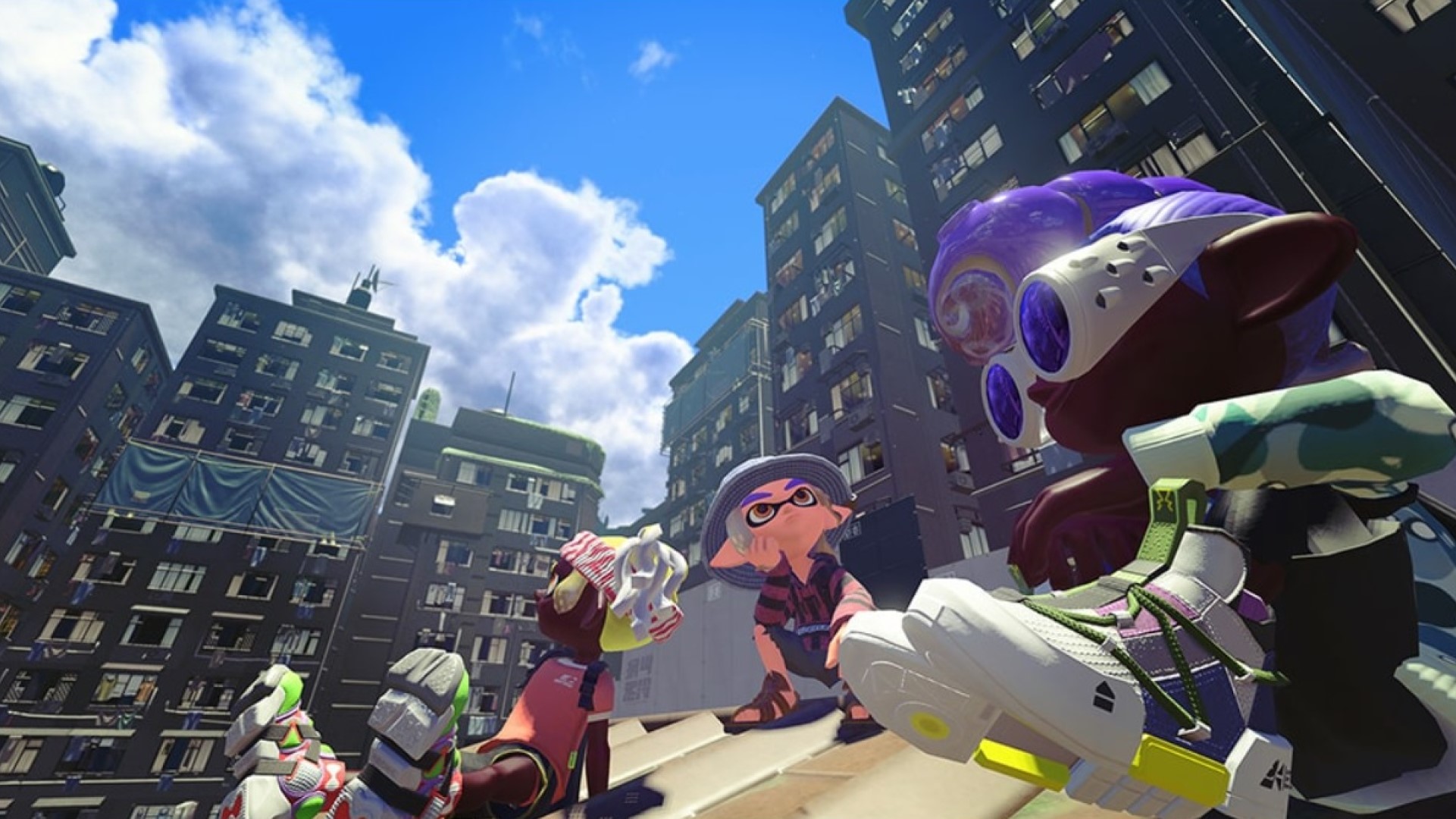
"A lot of what does work about Splatoon 3 is the same stuff that worked in the other two games."
Splatoon 3 inherits these strengths. It’s a joy to play this game when it works (we’ll get back to this in a bit). The moment to moment gameplay is inherently enjoyable, with the simple act of movement feeling satisfying (coming from Nintendo, the masters of movement and traversal in video games, this makes sense), and the paintball twist on a shooter keeps it fun on a structural level. Even if you don’t enjoy regular shooters, chances are very high you will enjoy Splatoon. Splatoon is not about lining up shots and killing enemies and making sure you have a good kill/death ratio. Even if you have zero dexterity, you play easily enjoy Splatoon, because you can get away with literally spraying your bullets (or, well, ink in this case) all over the map, which in any other multiplayer shooter would be a death sentence. The strong visual feedback from seeing the oozing, bright, colourful ink slowly slather the entire map keeps the feedback immediate and pushes you to keep further engaging with the game too. Where in other multiplayer shooters, less skilled players may get frustrated a little bit into the match because they don’t feel they are contributing, or because they feel they are not doing well, Splatoon allows them to feel like they are actually helping, via immediate, strong visual feedback, making them feel like they are actually doing well at the game. Where non-shooter fans might get bored of a match in another game, Splatoon keeps things brisk by having short, compact, frenetic matches that only last a few minutes at a time.
All of this carries over to Splatoon 3. If I were to simply assess this game on the strength of its core gameplay loop, I would honestly be hard pressed to find anything wrong with it. It’s clearly well thought out, and it is so compelling and fun. The issues arise with, well, a lot of the things that surround that brilliant core.
First, let’s talk about some of the extraneous issues that existed in the older games that have been resolved (or at least minimized) by Splatoon 3. Firstly, while map rotations are still a thing, they are clearly communicated, and switchovers happen often, so they aren’t as galling or annoying as they used to be in previous titles. Secondly, they don’t disrupt your game anymore. You don’t have to sit through long elaborate repetitive “talk show” style segments announcing the new maps every time you boot up the game before you can jump in, or every time a switchover happens. You can minimize them and have them play Picture in Picture while you continue to play the game. Thirdly, modes such as the excellent PvE horde mode Salmon Run, are now available at all times. Next, the single player campaign in Splatoon 3 feels far more satisfying and meaty than in either of the previous two games, taking cues from the well received campaign in Splatoon 2‘s Octo Expansion to deliver something more along those lines. Additionally, joining players from your friends lists in public lobbies is streamlined and simplified. Also, in Ranked Modes, you no longer maintain separate ranks for each individual battle format, and instead have one unified rank overall, which is much smarter and cleaner.
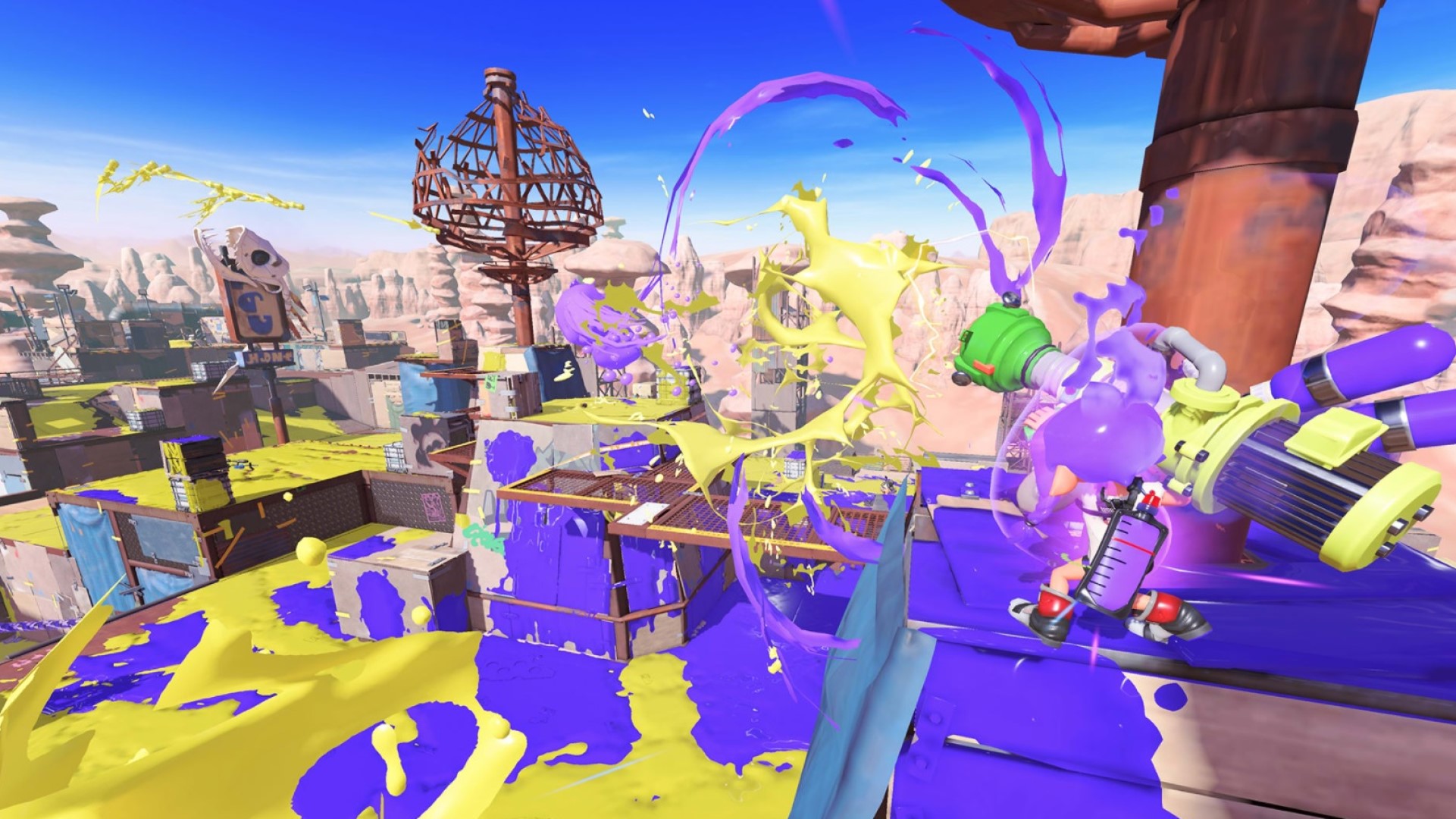
"If I were to simply assess this game on the strength of its core gameplay loop, I would honestly be hard pressed to find anything wrong with it. It’s clearly well thought out, and it is so compelling and fun. The issues arise with, well, a lot of the things that surround that brilliant core."
But as long as that list of improvements might seem, the list of issues is equally long. For example, much like Splatoon 1 and 2, 3 uses the same maps across the unranked Turf War mode (where the objective is simply to cover as much of the map in your team’s color as possible) and for the ranked, objective based modes. This is a far bigger issue than you might thing, because maps designed for Turf War are inherently not as well suited to many of the objective based modes Splatoon offers. Splatoon‘s ranked objective based modes are actually interesting conceptually, and at their best, really well thought out – but the maps often feel at odds with them, and sometimes it can be hard to shake off the feeling that objectives were almost haphazardly dropped on to maps that otherwise don’t lend themselves as well to the flow of competitive play.
Then there are other problems. Splatoon 3 allows you to play with friends; but especially in the unranked Turf War mode, there still seems to be no way to ensure that you and your friend will always be on the same team in a game. Of the few dozen games I have played with friends in Splatoon 3, it has honestly been a 50-50 chance that we end up on the same team. Now personally, I actually don’t care, but obviously this is a surprising omission, especially now that we are three games into the series. Allowing a simple toggle that lets people lock teams with their friends would be simple enough, but the best that I have been able to tell, this option does not exist.
The last issue is a major one for a game that actually locks you out of almost every single thing it offers when disconnected from the internet – albeit this is also the problem that is likeliest to not be an issue in the future. But you see, Splatoon 3‘s net code sucks. Once you have a game running, it is stable, with no perceptible lag, and holds up better than most other Nintendo games; it is, however, getting a game running that can be a miserable experience. Matchmaking can take up to a minute at a time (and for reasons beyond me, you can’t always back out of a lobby after matchmaking has started; for random lobbies, it seems you can do so at any time with no restrictions, however if you are partying up with friends or even just playing a new game in a lobby you already played a game in, you are locked in as soon as matchmaking for a new game begins with no way to back out).
The bigger issue? A lot of the times, after you have spent a lot of time trying to join a lobby, you get a connection error and then thrown out, and have to start all over. Trying to play another game in the lobby you just had a game in? Chances are high you get thrown out and have to start over. Sometimes you will even get disconnections in the middle of a game and get thrown out, and have to start over.

"I know a lot of this review comes off as harsh on Splatoon 3, but I need to make it clear, I love this game, my biggest issue is that very often it won’t let me play and enjoy it"
Obviously, a lot of these server stability issues are in part exacerbated by the fact that this is launch week, and Splatoon is absurdly popular, far more popular than most other Nintendo franchises (which means it is more popular than most video games in general). There are millions of players all rushing to play Splatoon 3 at the same time right now, and servers are obviously unable to keep up with that stress. Presumably, as things ease up in the coming days and weeks, this becomes less of an issue. But why is this an issue at all? Online is historically a problem for most Nintendo games, but most Nintendo games aren’t largely dependent on it. Yes, it sucks if/when Animal Crossing or Pokemon crap the bed with their online modes, but you can still spend hundreds of hours on them and never once connect to a server. Splatoon very literally is the closest a Nintendo game comes to an online-only title. As mentioned, there is a campaign, plus the Salmon Run horde mode can be played in local co-op, but that’s it. None of the other modes are available offline, even the game’s stylish aesthetic can suffer because you can’t even enter any of the stores to buy gear or items for yourself, those are all restricted to online only as well.
Splatoon 3 also has some issues unique to it. These aren’t big ones, but they do add more unnecessary friction to the experience. For example, this game has not one, not two, not three, not four, but at the very least five separate currencies that I have counted so far (and there may yet be more that I haven’t noticed). Obviously, Splatoon 3 has no micro transactions, and all of these currencies are earned entirely in game, but why in the world are these so many? Some of them I do understand existing, but some of them, especially the Meal Tickets (used for meals to get buffs before a match) and Sheldon Coupons (used to buy new weapons) feel unnecessary and extraneous. The elegance of the currencies and levelling systems in Splatoon 2 is missed.
I know a lot of this review comes off as harsh on Splatoon 3, but I need to make it clear, I love this game, my biggest issue is that very often it won’t let me play and enjoy it. That I am willing to put up with a lot of its issues to keep playing it speaks to how strong that core really is. And ultimately, a lot of my issues either won’t be issues in the long run – such as the connectivity problems – or don’t matter as much in the big picture, such as the multiple currencies and progression systems. The bigger problems I do have with the game, I had with the other two as well, but very obviously, my having those issues didn’t stop people from loving those as well. All of which is to say, if you loved Splatoon the first two times, you will love it this time around as well. This is the most content-packed this series has ever been at launch, and the most confident step forward it has ever put. Eventually a time will come when Splatoon has to deliver a new game that actually mixes up the formula. But for now, there is nothing else like Splatoon, and more of it is always a good thing. Splatoon 3 has its issues, but at its core, it is a rousingly enjoyable game that you will very much like if you were a fan the first two times.
This game was reviewed on Nintendo Switch.
Strong aesthetic and soundtrack; incredibly brilliant core concept executed to near perfection; very addictive and joyously fun to play; very welcoming to newcomers and those who typically tend to stay away from the genre; filled with a LOT of content at launch (and more will come); a surprisingly strong campaign; several much-needed improvements to QoL from previous games
The amount of network connectivity issues is insane and frankly unacceptable for a paid game on a paid service; map design feels unbalanced for a lot of the modes it is repurposed for; a glut of unnecessary currencies and progression systems










